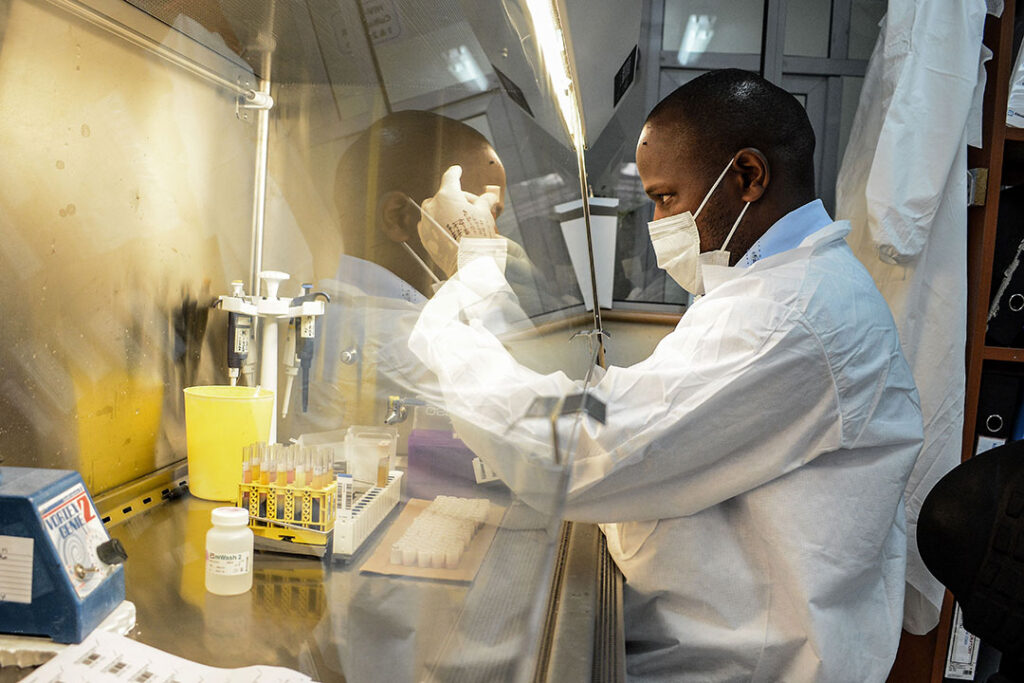ADF STAFF
If there is a silver lining to the dark cloud of COVID-19, it may be found among the test tubes and microscopes of Africa’s research laboratories.
From Dakar to Cape Town to Addis Ababa, the global pandemic has inspired an unprecedented burst of research among the continent’s scientific community. Researchers are delving into every aspect of the pandemic, from understanding the virus that causes COVID-19 to producing inexpensive testing kits to track transmission.
“COVID-19 has actually acted as a catalyst, a stimulus,” Dr. Joseph Okeibunor, team lead for research, development and innovation for the World Health Organization Regional Office for Africa in Brazzaville, Republic of the Congo, told ADF. “Every country is engaged in a search for a solution, and they’re trying to make a meaningful response to the pandemic within their jurisdiction.”
Although COVID-19 came late to Africa, decades of dealing with disease outbreaks such as Ebola, HIV and polio meant many — but not all — African nations were quick to respond with measures such as contact tracing to slow the spread of the virus.
Still, that wasn’t enough to nip this outbreak in the bud. As African countries instituted lockdowns, researchers launched projects to tackle the virus on multiple fronts.
- South African researchers began their first clinical vaccine trials on June 23.
- Senegal’s Pasteur Institute began developing a COVID-19 testing kit. The goal is a test that cost $1 and delivers results in 10 minutes.
- The University of Zambia worked to develop a full-body ventilator to support COVID-19 victims with compromised respiratory systems, a project that drew strong financial backing from the government.
The pressure to find a solution to COVID-19 also has become a catalyst for better relations between the scientific communities and national governments, Okeibunor said.
“There has been a sudden realization that you cannot make an effective response without reasonable evidence,” Okeibunor said. “Research for a long time has been given lip service. It’s on the lips of every policymaker that it’s important, but the commitment ends at that. Even when there is interest in research, you find there are no funds committed to that.”
But that situation has begun to change in the face of COVID-19.
In South Africa, President Cyril Ramaphosa and his ministers looked to the country’s scientists to guide policy, Salim Abdool Karim, an epidemiologist and chair of the Health Ministry’s scientific advisory committee, told Nature.
“There is a better relationship between science and politics now; it’s been very different,” said Karim, a veteran of South Africa’s struggle with HIV/AIDS. “They wanted to hear what we thought; they drew on our experience.”
South Africa leads the continent with about 60% of COVID-19 cases and deaths. It also leads the continent in testing.
Institutions like WHO’s Brazzaville office and the Africa Centres for Disease Control and Prevention in Addis Ababa are helping to guide research and relay information to the public. The Nairobi-based African Academy of Sciences (AAS) helps connect researchers spread across 54 countries as they develop research priorities for the continent.
A recent AAS survey of 845 researchers — 90% of them working in Africa — found that the priorities for research included understanding the virus’s history and transmission and developing quick and inexpensive diagnostic tests that can be used in the field rather than in the lab.
The report can guide governments in how best to invest in research and development, Dr. Moses Alobo, head of the AAS’ COVID-19 response, told The Conversation.
A lack of domestic funding remains the biggest hurdle to conducting meaningful research in Africa for Africa, Okeibunor said. Although international organizations like the Bill and Melinda Gates Foundation, the U.S. Centers for Disease Control and Prevention, and the National Institutes of Health actively fund research projects, the results often bypass nations where the research is conducted, he said.
“Our major problem is resources — local resources, domestic funding of research,” he said. “With COVID, the West is doing research for the West and the North for the North. The South has to do its own research.”
In that respect, the future of COVID-19 research in Africa is very much up to Africans, Karim said.
“We are building the ship as we are sailing it,” he told Nature. “But I think we are going to realize pretty soon that the best protection we have from this virus is ubuntu — a South African word that means ‘I am because you are.’ I am safe because you are safe.”

